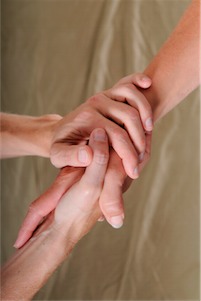Loss Of A Son Or Daughter
By Jon Terrell, M.A.

The most devastating loss we can experience is the loss of a son or daughter. The pain can be beyond something that most of us can bear. And yet we have to find a way. What do we do? How do we go on?
At our Grief and Loss Retreats in Florida, California and Massachusetts, I've worked with numerous parents who have lost a son or daughter. They are shattered, and sometimes hardly capable of being present. Their loss is overwhelming.
After a phone interview, many attend our retreats. Here, in a loving and non-judgemental environment, they can share their story of their son or daughter. The group helps carry their pain, providing relief, and allowing them to be more present.
But the retreats do something much more important. They provide a safe space for a mother or father to go deep into their own grief process in a way that would be almost impossible to do any other way.
Read on to find out more about our grief healing process and why it is effective.
Emotional Pain
We suppress difficult feelings they can be overwhelming and uncomfortable. From early childhood on, all of us have learned to suppress grief, anger and fear because these feelings were often unacceptable to our parents and others. And they made us uncomfortable.
We responded to our parents desires for us to be brave, for example, by suppressing fear, or we learned to “put on a happy face” when we sensed they didn’t want or even criticized us for being unhappy.
None of us want to be ridiculed for feeling fear ("don't be a scaredy cat") or grief ("don't be such a baby") or anger ("Don't you dare be angry at me!") Each family has different phrases that teach us to hide or suppress our feelings.
We all grow up into adulthood with a lot of suppressed feelings. Some of our suppression is important and necessary to grown up into a healthy toddler, adolescent and adult. But it also makes it difficult to be around others who are feeling and expressing their emotions—we can feel uncomfortable and uneasy around the display of emotions. It can trigger our own. And as a society we'd rather change the topic when uncomfortable feelings arise...especially grief.
So when devastation hits, like with the loss of a son or daughter, we are ill prepared. The pain is too much, too big and it just swamps us. We don’t know where to turn.
Where Do We Turn When We've Lost A Son or Daughter
- Bereavement Support Groups Hospitals and other organizations often provide groups led my social workers or other professions where people can share their emotional pain. These groups can be helpful to parents who have lost a child. The groups can help parents move from numbness and other phases of grief and loss.
- Psychotherapy/Counseling Some therapy professionals specialize in helping individuals and couples talk through their pain. They can provide a safe container for some emotional expression, although the main focus is in talking about what parents are experiencing. I used to do individual and couples therapy, and occasionally still do, but my focus has shifted to our retreats as they go much deeper and are far more healing than therapy. Read more about the retreats below.
- Friends and Family It can be quite helpful if you have someone or ones close to you that you can honestly share all aspects of what you are going through. Most people however, as we've said, can’t handle grief and the range of feelings grief invokes.. So friends and family instead turn to various forms of deflection of the emotions…you may have already experienced this. That is not what most of us need. See the next section for more on this.
- Partner, Husband, Wife Sharing the same intense loss of a son or daughter with a close loved one is valuable, but can often lead to relationship problems when one person is at a different phase of grief work than the other. And sometimes both can spiral down to a stuck place, pulling each other down. I usually don't encourage people to come to our retreats with someone they know except in the case of a loss of a son or daughter. At the retreats parents can learn powerful ways to help each other through deep pain.
Ways We All Avoid Feelings

Working through deep loss is about slowly digesting the experience. But it can feel to overwhelming and too painful. So we avoid it. And our friends and acquaintances don't know how to deal with such pain either, and will encourage you in avoiding your grief. But that doesn't really help in the long run.
- Giving Advice In my experience giving advice is the easy way out of uncomfortable feelings. We feel better because we helped and then are off the hook of being genuinely present when someone is in pain. I try never to give advice unless I am asked. There is a ton of advice and ideas about grief and loss, and most of it is not useful…grief has no set timetable or set stages to go through. The key is to learn to follow one’s own grieving process. Our retreats are designed around this idea of learning to trust one’s own unique process.
- Avoidance While people close to us feel obliged to say and do something at the beginning of our deep loss, they often disappear because they feel uncomfortable with their own and others’ feelings.
- Distraction "Lets go shopping or go out to eat or watch a movie." While some activity can lift us out of the deep gloom of grief, when we are in grief it is natural not to want to do much activity. These strategies often don't help, although some escaping from intense emotional pain can be fine, if it feels right. See the next section for what is helpful.
Some Things That Are Helpful For Grief
Grief likes darkness, lying down, enclosed spaces. It may look like you are not doing much, but inside healing is going on when you withdraw from life this way. At some point you will probably begin to sit up, go outside, and start interacting again, when you feel ready. If it feels to you like its been too long, you might want to check in with a grief specialist or your physician. Sometimes it is difficult to tell the difference between grieving and depression.
And sometimes we get stuck. This has been called complicated grief. In my experience over 25 years of leading grief retreats, people are stuck because another emotions is tied into their grief...such as anger. With the loss of a son or daughter our feelings can include not only grief, but anger at others or ourselves, resentment, jealousy, fear and other feelings.
Grief is wet…tears are helpful and necessary. For some people tears come easily, but for others, especially men, it's harder to cry. In these cases grief may not look like tears, it may look like anger or anxiety or even manifest as uncomfortable body sensations.
Again, each person's grief journey is different. When we are experiencing the loss of a son or daughter we may go through a range of feelings, sensations and thoughts. We may judge ourselves for doing grief wrong or for something we did or didn't do that we feel contributed to the loss. Working through these feelings and judgements are a major part of the work people do at our Grief and Loss Retreats.
Our Approach To The Loss Of A Son Or Daughter

We offer Grief, Loss and Difficult Emotions Retreats about 6 times a year, mostly in Massachusetts but also in Florida and sometimes in California. People come to these retreats for a variety of reasons, including the loss of a son or daughter.
All are there because they are experiencing intense emotional pain.
At the retreats all of you is welcome...all of your feelings, tears, judgements, thoughts, and pain.
What makes our retreats unique?
The retreats are centered on specific Principles and Skills Of Loving. We grieve because we loved. Participants practice these skills with each other at the retreat, which creates a powerful healing environment.
Our retreats are small group events, limited to 8-12 participants so everyone gets personal attention for their unique experiences.
The retreats are body-oriented. Feelings live in our bodies and minds, and most therapeutic approaches focus just on the mind. We don't ignore thoughts, but we understand that it is through our bodies that we feel our emotions...we cry to help heal grief, we shake and shiver to heal fear, etc.
We try to keep our costs as low as we can and often have some tuition assistance available to those who need it.
For more information about our retreats go here. You can reach me directly by leaving a message below.
Go From Loss Of A Son Or Daughter To Grief Retreat Page

